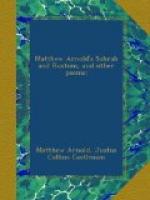=215-226. His long rambles ... ground.= Account for Tristram’s discontent, as indicated in these lines.
=234-237. All red ... bathed in foam.= The kings of Britain agreed with Arthur to make war upon Rome. Arthur, leaving Modred in charge of his kingdom, made war upon the Romans, and, after a number of encounters, Lucius Tiberius was killed and the Britons were victorious.—GEOFFREY OF MONMOUTH, Book IV, Chapter XV; Book X, Chapters I-XIII. According to Malory, Arthur captured many French and Italian cities (see ll. 250-251); during this continental invasion, and was finally crowned king at Rome. It seems that he afterward despatched a considerable number of his knights to carry the Christian faith among the heathen German tribes. See ll. 252-253. [171]
=238. moonstruck knight.= A reference to the mystical influence the ancients supposed the moon to exert over men’s minds and actions.
=239. What foul fiend rides thee?= What evil spirit possesses you and keeps you from the fight?
=240. her.= That is, Iseult of Ireland.
=243. wanders forth again=, in fancy.
=245. secret in his breast.= What secret?
=250-253.= See note, ll. 234-237. =blessed sign.= The cross.
=255. Roman Emperor.= That is, Lucius Tiberius. See note, ll. 234-237.
=258. leaguer.= Consult dictionary.
=261. what boots it?= That is, what difference will it make?
=303. recks not.= Has no thought of (archaic).
=308-314. My princess ... good night.= Are Tristram’s words sincere, or has he a motive in thus dismissing Iseult?
=373-374.= From a dramatic standpoint, what is the purpose of these two lines?
PART II
With the opening of Part II the lovers are restored to each other. The dying Tristram, worn with fever and impatient with long waiting, unjustly charges Iseult with cruelty for not having come to him with greater haste. Her gentle, loving words, however, quickly dispel his doubts as to her loyalty to her former vows. A complete reconciliation takes place, and they die in each other’s embrace. The picture of the Huntsman on the arras is one of the most notable in English poetry.
=47. honied nothings=. Explain. Compare with
“his tongue Dropt manna.”
[172]
—Paradise Lost,
ll. 112-113, Book II.
=81-88=. Tristram was born in the forest, where his mother Isabella, sister to King Marc, had gone in search of her recreant husband.
=97-100=. Tennyson, in The Last Tournament, follows Malory in the story of Tristram’s and Iseult’s death. “That traitor, King Mark, slew the noble knight, Sir Tristram, as he sat harping before his lady, La Beale Isoud, with a trenchant glaive, for whose death was much bewailing of every knight that ever was in Arthur’s days ... and La Beale Isoud died swooning upon the cross of Sir Tristram, whereof was great pity.”—Malory’s Morte d’ Arthur.




